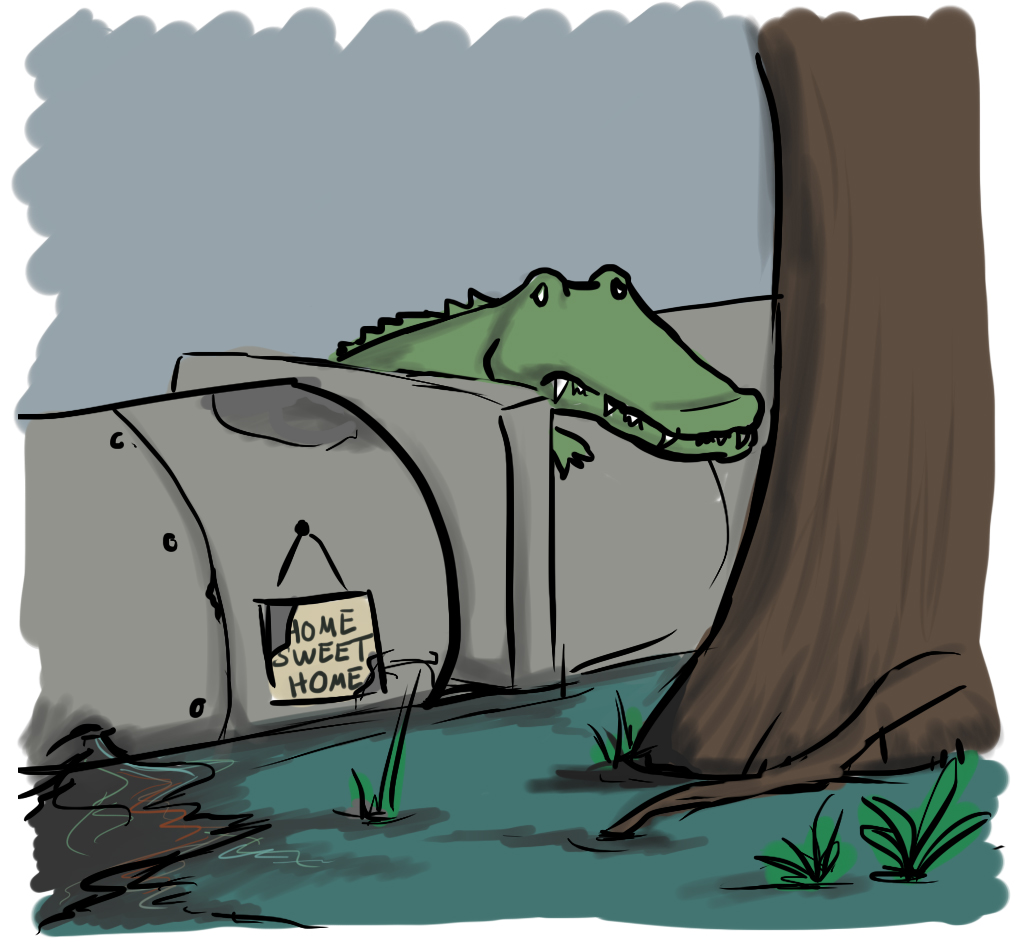Meet Florida’s DAPL: the Sabal Trail Pipeline


Terry Tan | Senior Staff Illustrator
While the media and activists have concentrated their passions and attention on the Dakota Access Pipeline over the past few months, other pipelines have been getting a free pass.
Since late November, my focus as an activist has been on the Sabal Trail Pipeline, a 515-mile-long channel that cuts through Georgia, Alabama and the heart of central Florida. The $3.2 billion project is projected to deliver about 1 billion cubic feet of fracked natural gas per day to Florida energy companies. This would mean enormous profits for the companies invested in the project — Duke Energy, NextEra Energy and Spectra Energy.
Even if we considered natural gas a bridge to clean energy, the construction of the Sabal Trail Pipeline steals private land, places a stockyard on conservation land, runs through land responsible for 60 percent of the local water source and disregards horizontal fracking in the sinkhole state.
Sabal Trail has used eminent domain to seize property from locals, indigenous people and small businesses multiple times over the course of its construction. While I was there for the latter half of winter break, I heard about countless people who had had their land taken in the course of the pipeline’s construction. One apartment complex’s residents, whose home was in the pipeline’s path, are now scrambling to find a new place to live. A Florida family whose entire orange orchard was seized received just $6,000 for the orchard, which had been in the family for generations and was worth well over a million dollars.
Though not as widespread as they are in the pathway of the DAPL in North Dakota, Native American treaty lands in the region are just as threatened by the Sabal Trail construction as off-reservation areas. In response to encroachments on their territory, the Seminole Nation and elders from the Sioux Tribe have pledged their support for efforts to stop the pipeline’s construction.
Two camps have already been established that act as a home base for water protectors when they are not on the front lines. And the Seminole, a tribe local to Florida, has announced that it will be setting up four additional camps. Even more recently, Lakota Sioux elders have pledged to help set up a “Standing Rock, Florida” which means they will counsel the protectors to organize, build and fortify the camps and individuals.
Besides being partially planned through eminent and native lands, the pipeline also cuts through regions of Florida the state had originally devoted to the environment for conservation. But instead of following through, Florida sold the land to the company constructing the pipeline to house construction supplies.
Numerous red flags that faced the project should have been caught and halted by regulation agencies long ago. To start, the pipeline is slicing through aquifers that provide 60 percent of Florida’s clean water to over 10 million people. It’s less a question of if the pipeline will leak into this water source than when. The leaks will be especially damaging due to the interconnection of a majority of the springs and aquifers through a series of underwater caves. Leaks in any part of the pipeline could affect other areas, miles away.
While natural gas and oil pipelines both irreversibly damage water sources, natural gas pipelines differ because unlike crude oil, odorless, colorless methane is harder to locate. If you’re lucky, the methane has been treated with chemicals that make it smell like rotten eggs. Although the potent smell of rotten eggs is helpful, it’s easily diluted in a vast waterway. Cleanup crews from potential spills might think a problem is solved — that the water is clean and safe — when in fact it’s just spread further.
The EPA has estimated that more than 900 acres will be affected as this pipeline drills underneath the Suwannee, Withlacoochee and Santa Fe rivers — over springs and through state parks, forests and recreational trails. In mid-December, Frank Jackalone, senior organizing manager for the Sierra Club in Florida, said the EPA’s sudden change of heart on this issue raised “the question of whether the pipeline’s powerful investors pulled political strings to get the EPA to back away” from this position.
The companies involved in the pipeline’s construction have decided that the “best” way to build their pipeline in these environmentally sensitive areas is to frack horizontally. Basically, this means the companies will use a high-pressure solution of water and undisclosed chemicals to break up the rock in a way that is similar to how fracking shale releases natural gas. The technique only adds to water waste, as it steals water from the aquifers to create the high-pressure solution and is extremely hazardous.
It’s hard to definitively prove a causal connection, but sinkholes are being increasingly paired with natural gas locations and models are continually showing how fracking can cause these sinkholes. Most of Florida sits on top of limestone, which leads to most of the geography being classified as karst — a crumbly crust characterized by caverns and sinkholes. It’s unwise to test one’s luck when it comes to the Earth. Simply put, regulatory agencies should have been more cautious when companies requested to horizontally frack through a sinkhole-prone state.
If reading this raised your blood pressure, please take action.
The last day of protests outside of the David Lawrence Convention Center is Thursday. Break down a cardboard box, grab a sharpie, make a sign and make your voice heard.
If just protesting isn’t enough, consider joining an environmental organization. Pittsburgh has many progressive groups — both student and civilian. If those don’t work for you due to the time commitment, be a social media activist.
But whatever you do, be an immovable force against injustice.
Recent Posts
Opinion | School should be in the summer
Although this may be controversial, I believe that from this data, it is evident that…
Weathering the storm: Pittsburgh teams have tackled some of the toughest environments
The end of the year in western Pennsylvania is always marked by two things —…
Notes From an Average Girl // Notes on Book Banning
In this edition of Notes From an Average Girl, senior staff writer Madeline Milchman writes…
To Be Honest // Yup, it is that damn phone
In this edition of To Be Honest, staff writer Evin Verbrugge writes about her phone…
Meaning at the Movies | Portraying Toxic ‘Adolescence’
In this edition of Meaning at the Movies, staff writer Lauren Deaton explores the mini-series…
Opinion | Climate change requires radical, immediate action
Contributing editor Emma Hannan talks about the effects of climate change and the actions cities…

